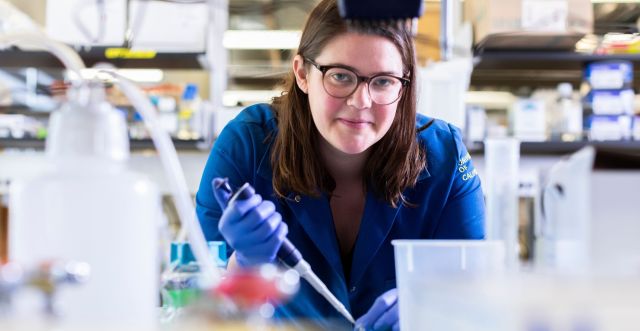T32 Faculty in the News: Professor Meghan Morrissey Honored by the American Cancer Society
Credit to Harrison Tasoff
Ten-Hut! Professor Meghan Morrissey has been training new cadets for the body's fight against the deadly enemy, Cancer. For her phenomenal work, she has been honored by the American Cancer Society.

The immune system is a microscopic army, always on alert for threats to our body. The fact that most of us maintain good health is a testament to the immune system’s capabilities. Some of the most cutting-edge cancer treatments aim to leverage our immune response, enhancing the body’s ability to recognize and destroy these wayward cells.
UC Santa Barbara's Meghan Morrissey is among those pioneering new kinds of immunotherapy, and her efforts have earned her the recognition of the American Cancer Society. The society will honor Morrissey with the prestigious Trailblazer Award at their 2024 Riviera Gala, "Where Hope Grows," at The Ritz-Carlton Bacara, Santa Barbara. The society selected Morrissey in recognition of her groundbreaking contributions to cancer research, particularly her innovative work in macrophage signaling and its potential applications in cancer immunotherapy.
“I am incredibly excited about the research we are doing in my lab, and thrilled that the American Cancer Society finds it as interesting as I do,” Morrissey said. She founded her lab at UCSB four years ago and is still ramping up. This award will build on that momentum. “It comes at a really critical time for me, as an assistant professor,” she added. “This award will help establish our lab's reputation in the exciting field of macrophage biology and cancer immunology.”
Nearly all of the current immunotherapies focus on one particular cell type: T cells. These cells are the foot soldiers of the immune system. However, this means that all of our current therapies are limited by what T cells are capable of doing. For example, T cells are not very good at penetrating solid tumors and can become exhausted in the tumor microenvironment.
Morrissey is developing immunotherapies that target a different cell type: macrophages. “Macrophages are the scouts, or sentinels, of the immune system, always scanning the environment and relaying signals to the rest of the immune system,” she said. While macrophages have the potential to kill cancer, they also have the potential to promote cancer growth. Understanding the signaling pathways that control macrophage behavior is critical for designing new therapies.
“Ultimately, I try to get immune cells to eat cancer,” Morrissey said. “To do this, we need to understand what makes immune cells particularly hungry, and what makes cancer cells particularly tasty.”
“I am thrilled to congratulate Professor Meghan Morrissey on receiving this recognition from the American Cancer Society,” said Professor Shelly Gable, Interim Dean of Mathematical, Life and Physical Sciences. “Dr. Morrissey’s research holds great promise in strengthening the tools we have to combat cancer and advancing biomedical science. We couldn’t be prouder to join the ACS in honoring her work on macrophage signaling and her dedication to developing new cancer immunotherapies.”